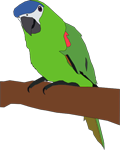Common ("Indian") Myna (Introduced)
Acridotheres tristis
Family: Sturnidae (Starlings and allies, 3 species in Australia)
Size: 23-25 cm
Distribution: Within about 100-200 km of the coasts of eastern Australia and VIC, around areas settled by people.
Status: Locally Abundant to Common
Habitat: Urban
References: Simpson and Day, Reader's Digest, Common Indian Myna Web Site
The Common Myna (usually called the Indian Myna) is a well known introduced bird of urban and settled areas. Some peope say it is regarded as Australia's number one feral enemy (which is a large claim considering the damage done by some of the other main feral species like the red fox and the cane toad). The indian myna takes over nesting hollows that would otherwise be used by native birds and small mammals, and they prey on nests of other birds. They are often seen around garbage bins and garbage in general.
Although it is easily the most hated bird in Australia and many other countries, in India, where they come from originally (and where they belong), people like them. In India the Common Indian Myna is called the “Farmer’s Friend” because it eats insects that destroy crop plants. The name myna comes from a Hindi word, “maina” meaning a bird of the starling family, Sturnidae, to which mynas belong. Mynas in India are also regarded as symbols of undying love, because they often pair for life and maina is also sometimes used as a term of endearment for young girls.

Photo: Lake Parramatta, NSW. High Resolution (2413 x 1858).

Photo: Lake Parramatta, NSW. High Resolution (1636 x 2394).

Photo: Lake Parramatta, NSW.
Some Birdwatching Resources
|  Nikon COOLPIX P1000 Super Zoom Camera Nikon COOLPIX P1000 Super Zoom Camera The Nikon COOLPIX P1000 is Nikon's longest zoom range camera, and probably still the longest zoom range of any camera in the world. For bird photography (and other wildlife photography) having a long zoom range is a massive help, since you don't have to be within a few metres of the birds/animals to get a good photo.
I'll write more about these super-zoom cameras soon as I have a loan of a Nikon COOLPIX P900, a slightly older model which also has a massive (though not as massive) zoom range as the P1000. The P900 can take photos of the rings of Saturn. It's basically a portable telescope with a camera built into it.
Most of the reviews from professional photography websites of the super zoom cameras complain far too much that their picture quality isn't up to that of a DSLR or other expensive modern camera. The problem here is that it's basically impossible to have a zoom anywhere near as long as the P900, P950, or P1000 on a typical DSLR with the "full-size sensor" that would keep the magazine reviewers 5-star-happy. To get things into perspective, with a full size (a.k.a. full frame) sensor of 35mm, the lens would need to have a physical focal length of 3000 mm (yes that is 3 metres). Even if made as a "mirror lens" where the light path can bounce back and forth once or twice, so that the lens can be physically shorter than 3 metres in length, it's still going to be something like almost metre long. And to have an aperture ratio of f/8 at the long end of the zoom range means the diameter of the aperture has to be 3000 divided by 8. Which equals 375 mm across. In other words, the diameter of the lens itself would have to be about 40 centimetres across (like a decent-sized telescope, which it literally would be). To carry your high optical quality 3000mm full frame lens, with a 40 centimetre wide end, made of heavy optical-quality glass, is probably going to require a vehicle of some sort. So that's what I mean by "basically" impossible to have a lens that zooms this close in a full size sensor type of camera. Incidentally, Nikon does make an actual 2000mm lens. It costs about $25-30,000 USD and weighs 18 kilograms. It's about 25 centimetres diameter across the front of the lens, and it's only f/11, which is smaller and dimmer (i.e. worse) than the f/8 of the Nikon P1000. But it would give you "full-frame sized sensor picture quality" (apart from the limitation of the aperture only going as big as f/11).
If you want to take photos of something small (e.g. a bird) from far away, these cameras are a truly new type of technological innovation — something which really did not exist before a few years ago. When, a few years ago, my mother saw one on a TV infomercial ad, and told me the P900 camera had an "83 times optical zoom", I honestly just assumed she had misheard and meant an 8.3 times optical zoom. The P100 has a 125x optical zoom, and can zoom in even further than the P900.
Purchase from Amazon.com.au
| See AlsoAustralian Bird Field Guides
Return to Australian Birds
Return to Site Map
Share This Page
common indian lens myna zoom
Content is copyright © Survival.ark.au 2005-2025 All Rights Reserved. Terms of Use. Definitely read the disclaimer before trying anything from this website, especially including the practices and skills. This website uses affiliate links – this doesn't cost you any more, but I get a commission on purchases made through the website. As an Amazon Associate I earn similarly from qualifying purchases.
|





